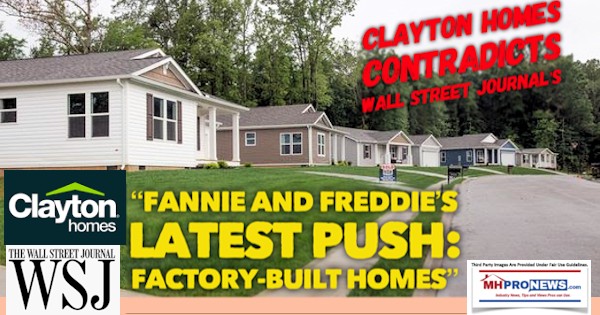
Earlier this week, the Daily Business News published a report that called into question several of the claim alleged by the Wall Street Journal (WSJ) in a report accessed via the linked text-image box below.
Clayton Data Debunks a WSJ Claim
The WSJ report said “Clayton says it sells about 42% of the manufactured homes in the U.S…” Really?
But this graphic from the Clayton website shown below said they had 47.7 percent market share in 2017. That market share is based upon home sales data. Are the WSJ reporters saying that Clayton has lost s0me 5 percent market share? Or are they suggesting that Clayton’s total sales fell in 2018? How can the WSJ justify their odd claim that flies in the face of Clayton’s own data?
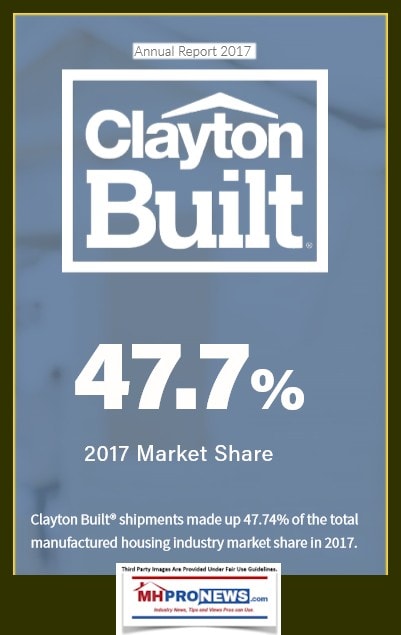
Among the claims made in their recent report was that the FHFA said that the industry was trending up. Here is how they phrased it.
“Manufactured-house shipments have trended higher since the financial crisis, according to the Federal Housing Administration.”
While the industry is up from the bottom (see over twenty years of shipment trend graphics, further below), the data obtained from IBTS on behalf of the Department of Housing and Urban Development — upon which the Manufactured Housing Association for Regulatory Reform (MHARR) and the Manufactured Housing Institute (MHI) rely upon — indicate that the trend in manufactured housing is now down year-over-year for 8 straight months.
Here is what a snapshot earlier this month from MHARR revealed.
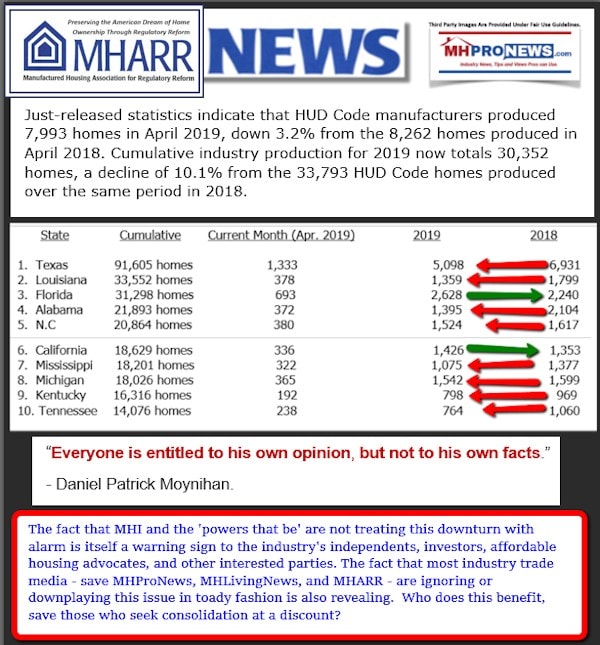
When the above and other concerns were brought to the attention of the WSJ, their writers, editors, and media relations professionals – they all said they reviewed the concerns presented – but would stick with their story as is. Here is how their senior communications director phrased it in a communication to L. A. ‘Tony’ Kovach at MHProNews.
“Hi Tony, I am the Communications Director for the Journal. We have reviewed your messages with our reporters and have determined the Journal’s reporting is fair and accurate. We stand by the reporting.
Many thanks,
Steve
Steve Severinghaus
Senior Director, Communications”
That was received from Severinghaus on Mon, Jun 24, 3:03 PM. Additional evidence and questions about other errors and controversial claims have not yet been addressed since then.
Fake, Weaponized News, Agenda-Driven News About Manufactured Housing
Pew Research revealed in a new survey in early June 2019 that public concerns over Fake News now reflects the perspective of half the nation. Here is how Pew’s graphic summed it up.
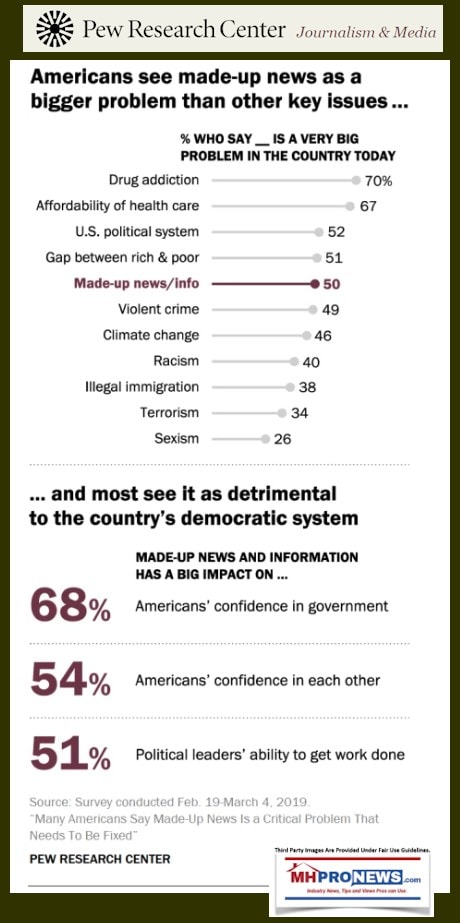
That is telling, and directly relates to reports like this one by the WSJ. While not all news or fake, spin, mistaken, or agenda driven, some reports more clearly reflect an open or hidden agenda. That spin or agenda-focused reporting that lack balance is arguably what those in the know see as “fake.”
It should be noted that the Society for Professional Journalism Code of Ethics contradicts the position the WSJ have taken.
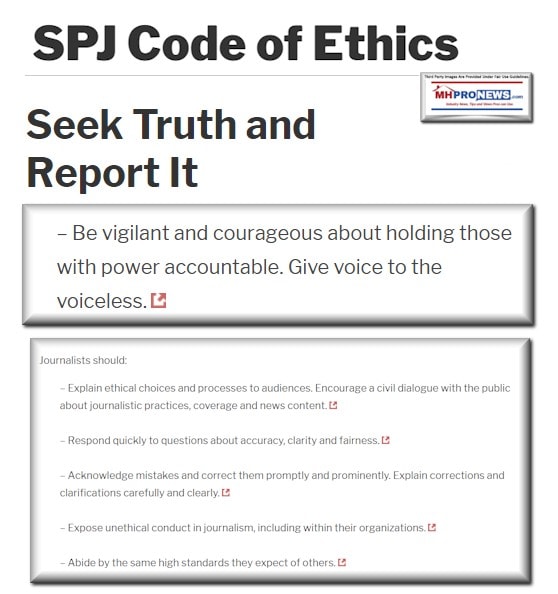
The WSJ did not deny that they failed to contact the National Association of Manufactured Housing Community Owners (NAMHCO) in doing their report. A NAMHCO source told MHProNews that the where not contacted.
Nor did WSJ representatives deny that they had interviewed Mark Weiss, President and CEO of the Manufactured Housing Association for Regulatory Reform (MHARR) for about an hour. That was confirmed by sources with MHARR, which went on to say that they provided the reporter information that contradicts what their report claims.
What the WSJ did was double down, ignoring those other sources, voices, insights, and perspectives.
This is not to imply that everything the WSJ report on Fannie Mae and Freddie Mac Lending was inaccurate or false. The way that spin is produced is often to include demonstrably true information with questionable, agenda driven, or false information mixed in. That way, only an expert can discern what is what. It makes the point previously shared by Brad Lovin of the North Carolina Manufactured Housing Association (NCMHA).
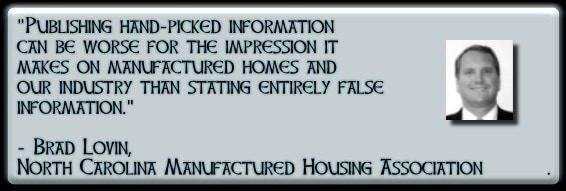
This article is valuable as an object lesson is not only fake or weaponized news, but who is behind it. Who benefits from this article as written? Several suspects become evident.
- Nicole — is a Berkshire Hathaway focused reporter, as her own bio says.
- Clayton Homes wanted to push their so called new class of homes.
- The Manufactured Housing Institute (MHI) is widely seen as the mouthpiece of Berkshire brands, such as Clayton Homes, 21st Mortgage and Vanderbilt Mortgage and Finance (VMF).
- Fannie Mae and Freddie Mac have paid MHI, ‘sponsoring’ events. That raises concerns over conflicts of interest. It should be noted that former House Financial Services Committee Chair Jeb Hensarling publicly questioned the propriety of lobbying by the GSEs.
Who does the status quo harm?
Who does the status quo in MHVille harm? Arguably manufactured housing independents, prospective consumers, and those manufactured home owners that might refinance existing chattel loans away from Berkshire owned brands if chattel lending was being done in earnest. A lack of growth, or declining sales harms independents. In fatigue, frustration, etc. a certain percentage sell out. As they do so, the value of their business is harmed by lower sales vs. higher ones, or lower community occupancy than higher occupancy, etc.
Rephrased, it harms the little guy, but can benefit the big boys.
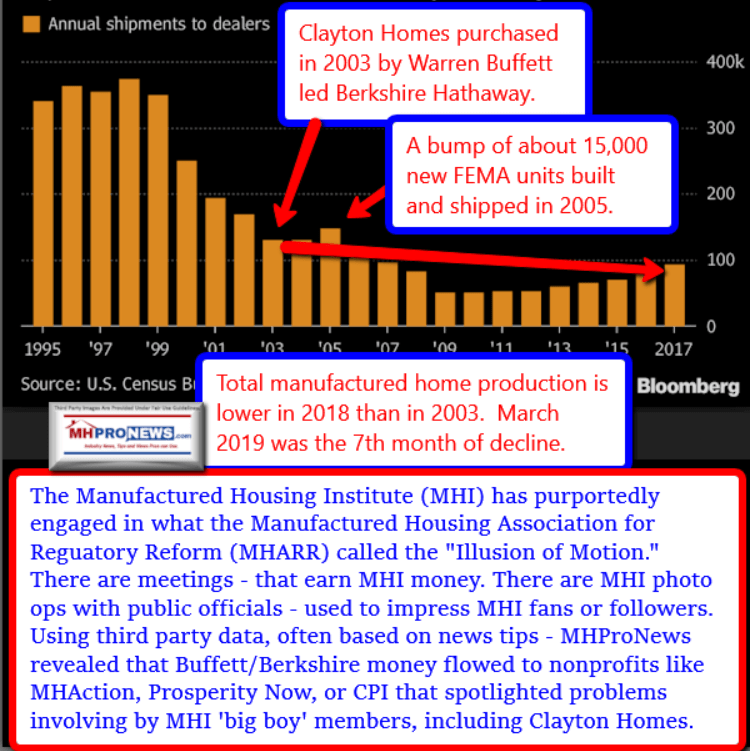
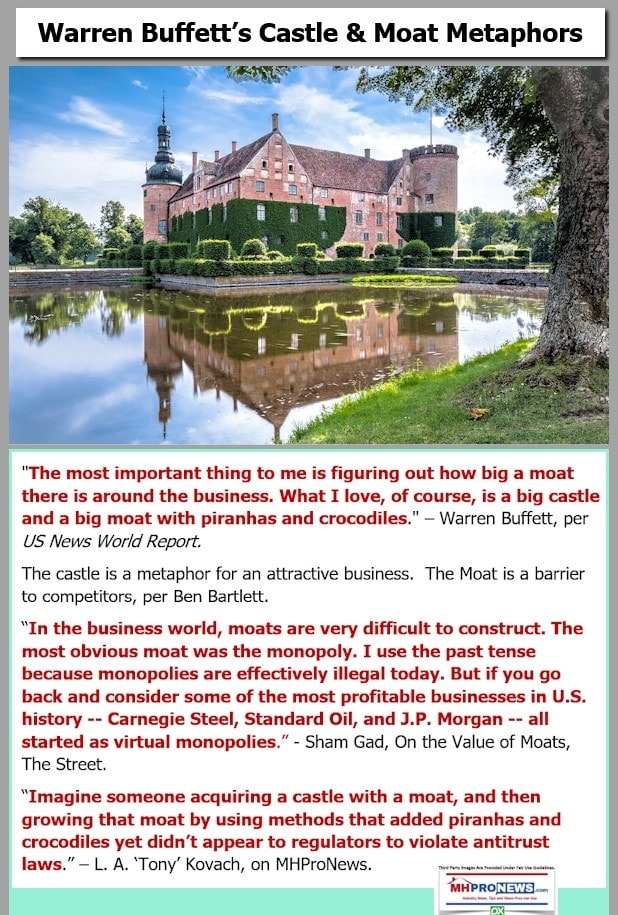
There is more developing on this WSJ topic, so stay tuned.
That’s another Thursday edition of manufactured home “Industry News, Tips, and Views Pros Can Use,” © where “We Provide, You Decide.” ©. ## (News, fact-checks, analysis, and commentary.)


1) Marketing, Web, Video, Consulting, Recruiting and Training Resources
Submitted by Soheyla Kovach to the Daily Business News for MHProNews.com. Soheyla is a managing member of LifeStyle Factory Homes, LLC, the parent company to MHProNews, and MHLivingNews.com.
Related Reports:
You can click on the image/text boxes to learn more about that topic.
MHARR Reiterates Call for DTS Investigation | Manufactured Housing Association Regulatory Reform
Washington, D.C., June 18, 2019 – The Manufactured Housing Association for Regulatory Reform (MHARR), in a June 13, 2019 communication to Fannie Mae Vice President Jonathan Lawless (copy attached), has reiterated its call for a congressional investigation into the failure of both Fannie Mae and Freddie Mac to implement the statutory Duty to Serve Underserved …
MHARR Calls on HUD Secretary to End Discriminatory And Exclusionary Zoning of HUD-Regulated Manufactured Homes | Manufactured Housing Association Regulatory Reform
Washington, D.C., April 30, 2019 – The Manufactured Housing Association for Regulatory Reform (MHARR) in an April 24, 2019 communication to U.S. Department of Housing and Urban Development (HUD) Secretary, Ben Carson (copy attached), has called on the Department to federally preempt local zoning ordinances which discriminatorily exclude manufactured homes regulated by HUD pursuant to the National Manufactured Housing Construction and Safety Standards Act of 1974 and the Manufactured Housing Improvement Act of 2000.
;

























